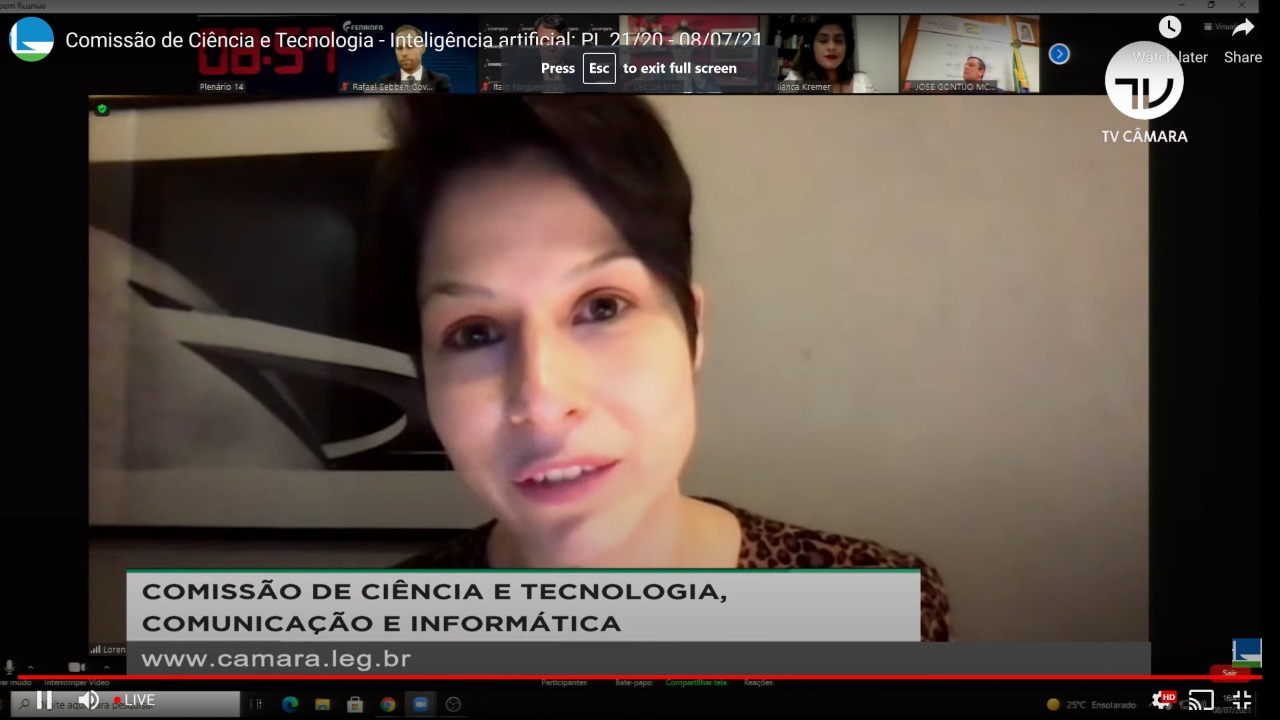A project on the subject gained an urgency regime in the Chamber and may be voted on directly in the Plenary
In a public hearing on Thursday (07/08), researchers and entities in the artificial intelligence sector called for caution in the efforts of the National Congress to regulate the sector. Currently, there are four bills on the subject in the Chamber of Deputies and another three in the Senate.
Appointed as "the legal framework of artificial intelligence", the proposals of the deputies (PL 21/20 and joined) are already processed under the regime of urgency and, therefore, they are ready for voting in the Plenary. The main one is authored by the deputy Eduardo Bismarck (PDT-CE) and it brings principles, rights, duties and governance instruments for the sector.
 ABES representative at the hearing, Loren Spíndola, highlighted the need for changes in the text, but recognizes that the legal framework is important to reinforce legal security in the area of artificial intelligence, especially in light of initiatives already taken in legislative assemblies in some states.
ABES representative at the hearing, Loren Spíndola, highlighted the need for changes in the text, but recognizes that the legal framework is important to reinforce legal security in the area of artificial intelligence, especially in light of initiatives already taken in legislative assemblies in some states.
The director of the National Federation of Information Technology Companies (Fenainfo), Rafael Sebben, declared that the “entity is very opposed to any type of regulation. What we want is for our companies to be able to work freely, complying with existing legislation”, he said. Sebben argued that the General Law for the Protection of Personal Data and the Consumer Defense Code already meet several points provided for in the proposals for the legal framework of artificial intelligence. The entrepreneur fears that the accumulation of norms “strains a sector that is dynamic”.
The president of the Federation of Associations of Brazilian Information Technology Companies (Assespro), Ítalo Nogueira, preferred to suggest improvements to the bills, such as regulating only the use and not the research or development of technology. Nogueira also recommended the reduction of punishments foreseen and expansion of support and promotion for the sector.
The director of the Artificial Intelligence Center at the University of São Paulo (C4AI/USP), Fábio Cozman, recalled that the constant evolution of the subject has imposed caution in the regulation in several countries. “The legislative effort must avoid creating excessive ties that could delay our progress. For example, the European Union hopes to discuss this proposal over the next two or three years. And the complexity of the theme is revealed in the very difficulty of defining some terms", he explained
The coordinator of Public Policies of the Institute of Reference in Internet and Society (Iris), Gustavo Rodrigues, asked for more debates so that the text finds ways to overcome what he called the “abyss between the ethical promises of the lists of principles and public declarations of companies and the reality of discriminatory use of artificial intelligence”.

Luisa Canziani: debate will be expanded, despite the urgency of the proposal / Credit: Pablo Valadares/Câmara dos Deputies
“It is necessary to go beyond ethics and deepen the debates on rights and obligations. So, considering the importance of a regulation like this, whose content will enormously impact the country's social and economic reality over the next few decades, this debate needs to be the object of a broad, participatory and multi-sectorial construction, as was the case with the civil framework of the internet and the LGPD”, said Rodrigues.
The rapporteur of the proposals for the legal framework of artificial intelligence in the Science and Technology Commission, deputy Luisa Canziani (PTB-PR), promised to broaden the debate, despite the urgency of the procedure.
“In fact, the urgency was approved, including for us to take this discussion to the Plenary and give prominence to the agenda. Obviously, we are going to submit the rapporteurship to a lot of dialogue, construction, listening and a lot of reflection so that the text is ripe for voting”, said the parliamentarian.
Sources: Agência Câmara de Notícias and ABES














